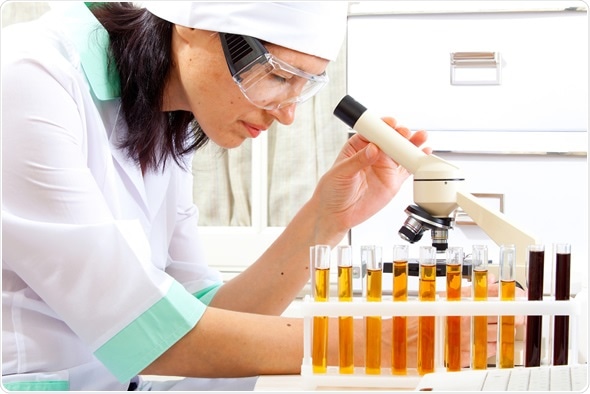A comprehensive chemical analysis is essential for complete understanding of the chemistry of a substance. A branch of chemistry dealing with the chemical composition of samples and their qualitative and quantitative measurement is known as analytical chemistry.
This discipline not only deals with general knowledge concerned with the use of analytical instruments, but also with the analysis of experimental data.

Image Copyright: Zholobov Vadim / Shutterstock
Analytical chemistry has evolved considerably over the past few decades – from the traditional conception held for centuries to a contemporary, active discipline of chemistry. Foundations of this discipline are materialized in keywords such as metrology, information, analytical properties, analytical measurement, and analytical problems.
In the field, analytical chemistry can be applied for the detection and quantification of various chemical compounds (such as heavy metals in water or tissue samples). It also comprises many different spectrochemical methods that are used under diverse experimental conditions.
The Definition of Analytical Chemistry
Analytical chemistry is usually described with four simple definitions. The first of them was formulated by the Working Party on Analytical Chemistry of the European Federation of Chemical Societies and states that this discipline is in charge of analysis of both the nature and composition of the matter.
Other three definitions state that analytical chemistry is in charge of the production of so-called biochemical information, that it is the discipline of biochemical measurements, and that it can also be considered the chemical metrological discipline. In any case, its strategic significance emerges from the fact that it is essentially an information discipline and (as such) indispensable to modern society.
Aims and Objectives
There are two essential aims of analytical chemistry: intrinsic aim - attaining analytical information of the highest quality with low uncertainty - and extrinsic aim - solving often complex analytical problems derived from biochemical information in a myriad of different areas such as health, industry, and the environment.
There are also basic and applied sides of analytical chemistry that are usually in contradiction, requiring in turn adequate harmonization. Intrinsic aim is often irreconcilable with procuring the results in a timely and economical manner, as better biochemical information requires additional time, more materials, and also more human resources.
Therefore, certain quality compromises are often necessary in order to balance the aforementioned two aims, which should be clearly stated before implementation of specific analytical procedures. It must be taken into account that the utility of the numerical results depends upon the degree of accuracy.
One imperative goal of analytical chemistry is to find and use reliable references. Improperly employed or poor references can produce results of deficient quality, regardless of the suitability of the technical means or the high standard of laboratory performance.
Fundamental Elements of Analytical Chemistry
Three essential components constitute analytical chemistry as a discipline. Maybe the most important among them is efficient research and development, since this alone makes analytical chemistry an independent science. It enables the usage of analytical methods for implementing new analytical processes, improving existing ones, as well as solving novel analytical problems.
Still, the body of existing analytical processes and tools found in the literature can be used to solve analytical problems with little or no research and development effort. The recommended procedure is followed in order to implement specific analytical processes in the laboratory.
The third fundamental component of analytical chemistry is education which can guarantee a proper conception of this scientific field by transferring its true milestones to future generation of professionals, as well as fostering interest in research and development.
Further Reading
Last Updated: Jul 22, 2023